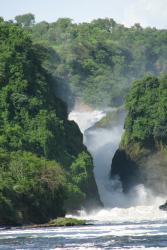Safeguarding our natural resources т how do decision-makers decide?
 An African waterfall thunders through a forest.Human activities are increasingly threatening the very elements that we need for our own survival, from clean water from forests, to ensuring the survival of crop-pollinating insects.
An African waterfall thunders through a forest.Human activities are increasingly threatening the very elements that we need for our own survival, from clean water from forests, to ensuring the survival of crop-pollinating insects.
Scientists call these naturally occurring aspects on which we rely тecosystem servicesт and many governments are shifting their conservation policies to take these vital тecosystem servicesт into consideration.
Scientists are rushing to create тmodelsт which can predict both the availability of these services, sometimes as basic and intrinsic as water, grazing or land for crop growth and the demand for them.
There are now many such models- but they need validating- checking against reality, so that decision-makers know which model would be most suitable for their needs.
Research published in has revealed that the more complex models are the most accurate and so provide the best foundation for planning.
As lead author, Dr Simon Willcock of ЯуИлСљКЯВЪЙвХЦзЪСЯтs School of Natural Sciences explains:
тWe have shown that more complex models are generally more accurate. So, if a decision-maker wants the best possible picture, they should use the most complex model available to them. We also show that our understanding of the social processes involved in the use of nature are poor, but these processes are very important in Africa and so need further study.т
Co-author and University of Southampton project leader Prof Felix Eigenbrod adds:
тOur work is particularly relevant for places where we have relatively little data, such as sub-Saharan Africa.т
The work was conducted by ЯуИлСљКЯВЪЙвХЦзЪСЯ, the University of Southampton and the Centre for Ecology & Hydrology, with co-workers across Europe and Africa, and funded by the UK governmentтs Ecosystem Services for Poverty Alleviation programme ().
Publication date: 24 April 2019
